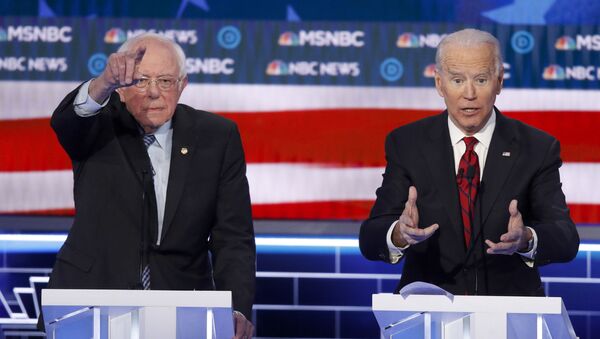Following a win in the Democratic primary in South Carolina, Barack Obama's VP, Joe Biden is considered to be leading the primary race in most of the called states, Timothy Hagle, a political science professor at the University of Iowa commented on the exit-polls.
“To some extent this isn't a surprise as far as the Southern states are concerned (VA, NC, AL, TN, and AR). More surprising were his apparent wins in states such as Minnesota and Massachusetts", the expert noted, suggesting Biden’s current rating in the states were helped by the endorsements of Amy Klobuchar and Pete Buttigieg, who dropped out of the Dem race ahead of Super Tuesday.
According to Hagle, the Dem contest has evolved into a largely “two-person race" in light of Biden’s projected gains on Super Tuesday, while Bloomberg, who was up for vote only in the latest round and whose political campaign rests on being the alternative to “what seemed to be a failing Biden” is now “basically irrelevant".
Likewise, Elizabeth Warren, of Massachusetts, “is effectively out of the race as well” given the prospect of her coming in third in her home state.
The academic stressed it is California along with Texas, the states with the largest number of delegates at stake, that have the upper hand in the continuing Super Tuesday struggle.
Due to the proportional nature of delegate allocation “support for Sanders and Biden, and perhaps others, could be concentrated in a few areas which would allow them to pick up some delegates", Hagle stressed.
While Texas results are just in, with Joe Biden calling it a “W” in his latest tweet, in light of the way the “golden state” counts its votes, “we might not know for sure the outcome for at least few days", Hagle pointed out.
As he put it, it looks like Biden having revitalised his campaign is enjoying the momentum for now, however since there will be further states where Sanders is strong, “it’s hard to say whether Biden or Sanders will have enough delegates to win at the convention on the first ballot".
Whatever the outcome, it might be closer than some anticipated only days ago, the analyst summed up.
Biden vs. Sanders: What’s at Stake?
Once a packed field of more than two dozen, including women and candidates of colour, the Democratic contest is now unfurling around two candidates with starkingly different visions for the US.
While Biden, called out for his overly long Washington insider past, promises to restore “decency” after Trump’s tenure, self-proclaimed Democratic socialist Bernie Sanders, is proposing landmark transformations with a comprehensive multi-trillion, higher taxation plan that would cover all domains – from healthcare to education.
Sanders’ supporters tend to emphasise that other candidates’ positions are far too moderate to offer big changes. Despite being a sitting US Senator for Vermont, which almost unanimously voted for him, Sanders is believed to enjoy the appeal of an “outside” candidate, says Chris Cooper, professor and head of the Department of Political Science and Public Affairs at Western Carolina University.
According to Barry Eidlin, Assistant Professor of Sociology at McGill University, liberal firebrand Bernie Sanders' popularity boils down not only to “the inability of the mainstream Democratic Party to respond to working class Americans’ core concerns, exemplified by Clinton’s 2016 campaign”, but also, the way he sees social justice:
“In contrast to mainstream Democrats, Sanders provides a compelling vision of social and economic justice, backed up by decades of commitment to the cause", Eidlin commented, going on to say he not only diagnoses the issues, like “unchecked power in the hands of a small group of billionaires” and a “rigged system” but provides a positive vision of how to tackle it - “a broad movement based in the multiracial working class organising to fight back".
The compelling stance and sincerity bring about no less loyal and committed armies of volunteers, the academic pointed out:
“His supporters are fully committed and energised, which is reflected in his volunteer army and unprecedented fundraising hauls".
“These voters understand that with Sanders, what you see is what you get", Eidlin noted pondering on why Sanders emerged as one of the undeniable frontrunners in the Dem battle to potentially take on Donald Trump in November.
Joe Biden has so far won nine of the 14 states that headed to the polls on Tuesday, taking the key state of Texas from his chief challenger, Bernie Sanders.
However, the leader in terms of delegates, California (415), has so far reported on no more than 70 percent votes, which are basically in Sanders’s favour.




